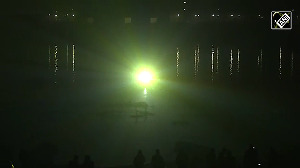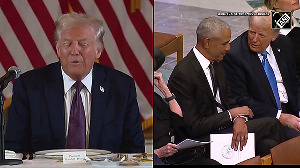The much-awaited trial of Amir Ajmal Kasab, the lone surviving terrorist in the 26/11 Mumbai terror attack, has commenced but the problem of finding a lawyer to represent him persists.
Kasab, who was produced before the trial judge on Monday via video conferencing due to security concerns, has expressed his desire to be represented by a lawyer.
Legal experts say it is now the duty of the court to provide legal assistance to the accused. A standing counsel from the government's panel of lawyers will have to be selected and convinced to defend Kasab.
However, lawyers in Mumbai courts have refused to take up Kasab's case.
Kasab now has two options before him in case none of the lawyers refuse to take up his case. He could either seek a transfer of the case to another court in India or take the option of defending himself.
India's Constitution and criminal laws have a provision where an accused -- even in a trial court -- could seek the option of defending himself. In terrorism-related cases, this option was last taken by Parliament attacker Afzal Guru.
Legal experts say it will be difficult for an accused to defend himself in a trial court especially when the procedures are very technical.
Former Supreme Court judge Justice Santhosh Hegde says it is the duty of the court to convince the accused to take a lawyer. The court also has the responsibility of convincing the lawyer to take up the case.
Kasab, being a Pakistan national, is definitely not aware of the procedures of Indian courts and hence in his defence he is expected to do a shoddy job. Several persons in the past who have defended themselves have used this as a defence before the appellate court. They have stated that they have not been able to understand the procedure and hence were not able to make their case stronger.
Justice Hegde says that this argument is no longer available for any accused who defends himself in a trial court. The Afzal Guru case laid a precedent regarding a similar situation, he added.
Guru argued his own case before the trial court and before the Supreme Court he complained that he was not provided legal assistance. He also argued that his case was weak since he was unaware of the complete procedure while arguing the case.
The Supreme Court, however, threw out his argument while observing that if the trial court gave ample opportunity to an accused and even suggested finding him a lawyer, then this argument was not available.
The fact that a legally illiterate accused has chosen to argue his own case does not give him the ground to argue that his case had become weaker only because he appeared party in person, Justice Hegde pointed out.
Legal experts are of the view that any lawyer who is appointed by the trial court must take up Kasab's case since this is a matter of international ramification. The world will be watching the trial and the fact that no lawyer has come forward to defend the accused will only give the world the impression that a fair trial has not taken place.






 © 2025
© 2025